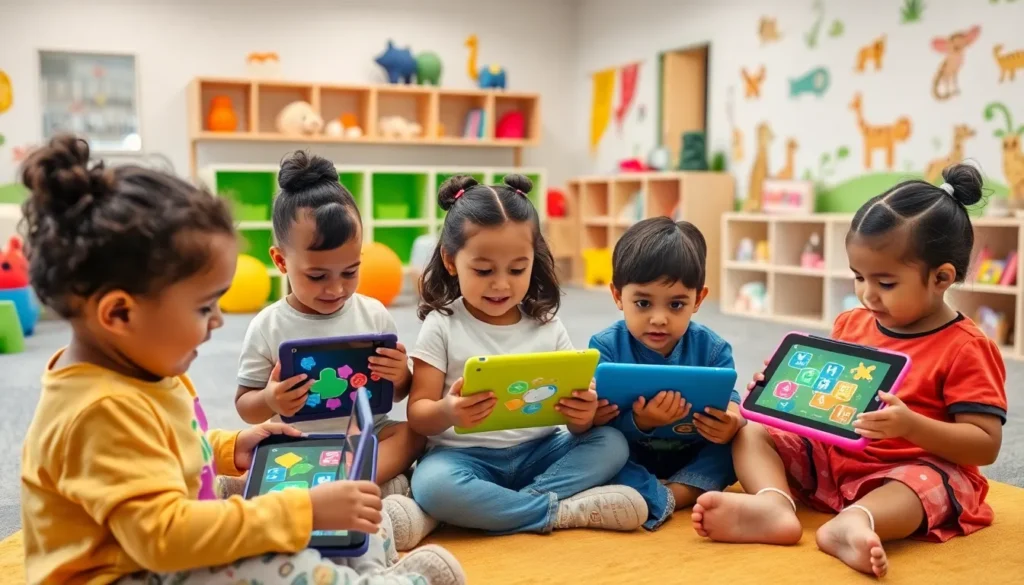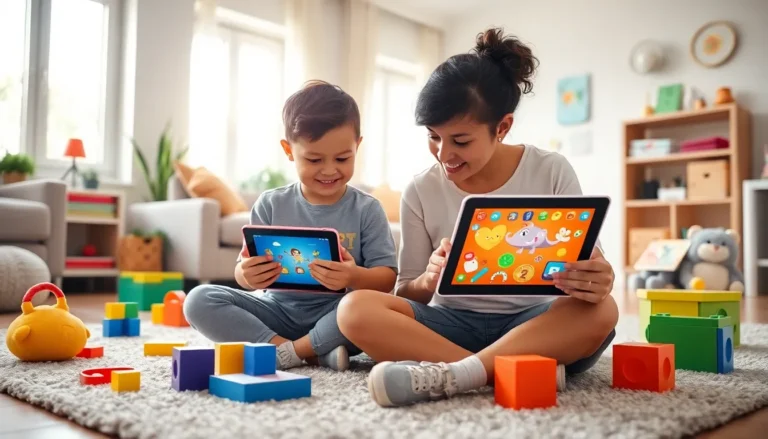Imagine this: your two-year-old is sitting quietly, not making a mess, and actually learning something. It sounds too good to be true, right? Educational apps for toddlers blend fun with education in a way that both you and your child will love. These apps can be a parent’s secret weapon in fostering development while keeping little ones engaged. So why not jump into the colorful world of toddler tech? Let’s explore how these apps can turn screen time into a positive experience.
Table of Contents
ToggleBenefits Of Educational Apps

Enhancing Cognitive Development
Educational apps stimulate a child’s brain, encouraging cognitive development at a crucial stage. With engaging visuals and sounds, these apps promote sensory awareness, allowing little ones to explore concepts like shape recognition and color differentiation without overwhelming them. This interactive format fosters an eagerness to learn, nurturing curiosity from a very young age.
Improving Communication Skills
Apps designed for toddlers often introduce basic vocabulary and language skills. Through catchy songs and engaging stories, they help enhance a toddler’s communication abilities. The repetition and interaction create a fun environment where children can learn to express themselves. They can practice pronouncing words, singing along, or listening to engaging dialogues, boosting their confidence in communication.
Encouraging Problem-Solving
Many educational apps incorporate problem-solving scenarios that challenge young minds. Solving puzzles or completing tasks can develop critical thinking skills. This process not only keeps children entertained but also teaches them resilience. When faced with challenges, toddlers learn that failure is a part of the learning journey, encouraging persistence at a young age.
Top Features To Look For In Apps
Age-Appropriate Content
Selecting age-appropriate content is essential when choosing educational apps for toddlers. Ideally, the material should cater specifically to their developmental stage. Look for apps that cover basic concepts related to shapes, numbers, or colors designed for a two-year-old’s understanding. Avoid overly complex games which might lead to frustration.
Interactive Learning Experience
Interactive features in apps keep toddlers engaged and promote hands-on learning. Many successful educational apps use elements like touch screens, sounds, and bright visuals to draw children’s attention. These apps often include quizzes or fun activities that encourage participation. Filling in blanks, matching games, or simple drag-and-drop tasks can significantly enhance the learning experience.
Parental Controls And Monitoring
It’s wise to choose apps that come equipped with parental controls. Being able to monitor in-app purchases or screen time helps ensure a safe digital experience. Also, many apps offer progress tracking features, allowing parents to assess their child’s development. This provides peace of mind, knowing that the app supports learning without unexpected distractions.
Recommended Educational Apps
Language Development Apps
An excellent choice for toddlers looking to enhance language skills includes apps like “Endless Alphabet” and “Word Party.” These apps introduce new words through interactive and entertaining stories, helping toddlers expand their vocabulary in a fun way.
Math And Logic Apps
For budding mathematicians, apps like “Duck Duck Moose’s Moose Math” or “Endless Numbers” provide delightful platforms for early math education. These apps combine games with fundamental math concepts, making learning numbers and simple addition feel like play.
Creative Games And Activities
Apps that inspire creativity can be incredibly beneficial. Titles like “Drawing with Carl” or “Bebop’s Art Adventures” allow kids to express themselves through art and music. Such activities foster creativity while boosting fine motor skills and hand-eye coordination.
How To Introduce Apps To Your Child
Setting Time Limits
When introducing educational apps, setting time limits is crucial. Experts recommend no more than one hour of screen time for toddlers. A schedule helps instill healthy tech habits that prevent over-reliance on devices while still allowing exploration. This balance keeps learning joyous without feeling overwhelming.
Guided Participation
Supervising your child’s interaction with educational apps can enhance learning. Engaging with your child during app usage creates a shared experience that fosters discussion and deepens understanding. Ask open-ended questions about what they’re learning or encourage them to explain why they made specific choices in games.
Incorporating Play With Learning
Merging play with learning can enhance a toddler’s educational experience. Use educational apps alongside traditional playtime activities for a diverse learning environment. For instance, after a session of a math app, play a related game using toys. This helps reinforce lessons and creates a holistic approach to learning.








